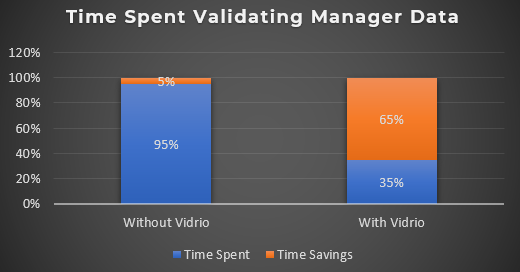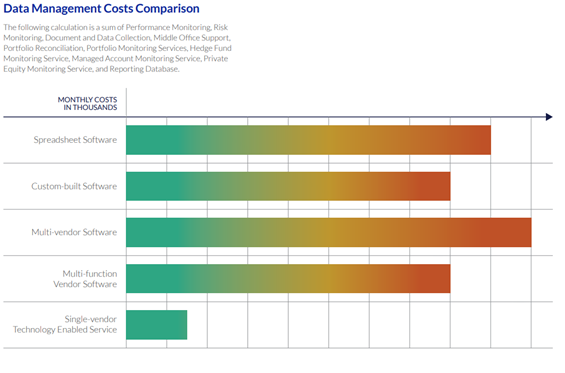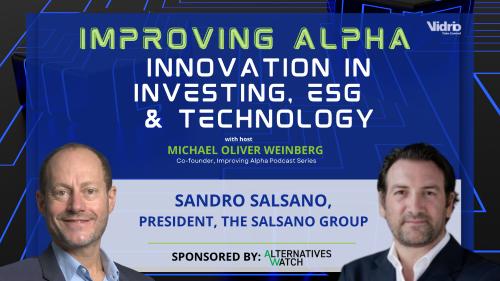How do institutional investors fix the data management challenges that plague the industry? Vidrio is continuing our investment in advancing data automation processes and controls for the future. Learn more in our latest blog.
By: Hattan Jabban, Business Development Executive, Vidrio Financial
In Vidrio Financials’ ongoing quest to enhance data accuracy and strengthen data intelligence controls for institutional investors, we are constantly listening to the recurring data management concerns of multi-asset portfolio leaders.
Not intended as a comprehensive list, this blog summarizes some of the top data management challenges we’ve been observing surrounding unstructured data in institutional investing. In addition, we wanted to use this blog to offer our perspective on data standardization, data collection, digitization, reconfigurability, and beyond.
Top data management concerns:
1. My data is a strategic asset that requires investment. How can I invest in my data to improve my operations?
2. My analysts are being flooded with data. How can I reduce the time spent on data accuracy?
3. Incoming data is unstructured, chaotic, and disorganized. How can my data be digitized on a single platform and easy to manipulate? What role do machine learning and artificial intelligence play in presenting a solution for data management challenges?4. Why can’t all my data sources come through a single feed into a clean file for reviewing both public and private market holdings?
5. How can I decrease my reliance on Excel spreadsheets when older portfolios seem to have incomplete data and lack an audit trail on who’s managing the data with a single source of truth.
Standardization Issues:
As investment teams navigate public and private markets, many are faced with increasingly intricate data sets. Investors have shifted their portfolios toward alternative assets such as private debt, real estate, and infrastructure, creating a greater need for comprehensive standards in handling various complex data pipelines. Vidrio recognizes that data standards are crucial in maintaining a single, reliable source of data truth, as the complexity of the data expands, and reporting is spread across months, quarters, and annual periods.
Despite advances in alternative investment solutions and artificial intelligence, older portfolio tracking strategies (spreadsheets) are plagued with missing data and lack audit trails for those who make regular spreadsheet updates. Sadly, we have found that most allocators are still heavily reliant on Excel and quick button actions that create PDF reports on the fly. In October of 2023, Vidrio attended the European Fund Operator Summit where several data takeaways came to light through the featured panel discussions at this event.
At this event, many allocators agreed that they need to constantly stay on top of their data quality, making it accessible to all, versus being siloed in a single department, and that data should be transparent to all users. One investor remarked on the time lost when an analyst left the company and took the necessary passwords with him, leaving no backup processes in place for anyone to pick up where they left off. Events like these, can be mitigated to some extent by having data management tools in place where data is pushed/pulled through automation workflows, while machine learning identifies, extracts, and reconciles the incoming data pipes.
A successful data management strategy relies on a combination of strategy, technology, team cohesiveness, and collaboration. In a recent scenario involving Vidrio, a significant pension fund was using Excel to monitor billions of dollars in alternative investments. However, they encountered challenges in keeping performance valuations up to date while they also faced limitations in monitoring functions and struggled to integrate their alternative portfolio data with the rest of their investment portfolio. In this case, Vidrio stepped in as a partner, to help align disorganized data into a unified system that helped the allocator meet their needs seamlessly. This allowed investment teams to refocus their time on manager selection and monitoring, rather than wasting time managing and massaging data that never seemed to perfectly align. It’s important at this stage to point out that Vidrio’s approach to data is agnostic as our systems are designed to handle any data feed or format that is provided to us, allowing the allocator to get back to larger projects as this use case illustrated.
Not all data management solutions are created equally, with many never scaling past a simple data collection service. Vidrio is leading the way in building a true data management solution that scales beyond the simple collection process. Vidrio’s perspective is to take on the responsibility of allocator data through collection, enrichment, analyzation, and visualization of that data. We filter out the data noise, providing allocators with actionable data intelligence to make better allocation decisions for the future.

Digitization, configurability, and scalability
Digitization or digital transformation is continuing to be mentioned across the industry, yet cautiousness still exists. Whether you are a sovereign wealth fund, pension, endowment, family office, OCIO, or asset manager, all seem to agree that the widespread adoption of digitized data will enhance and streamline reporting analytics in the future. However, we are still seeing allocators bump up against limited infrastructures and having to invest significant amounts of time to switch data pipes and portfolio information over to a more digital/streamlined process.
Speaking with clients and prospects, we found that the time spent validating manager data, drastically declined for our clients that used Vidrio (or a similar solution platform) vs. those that relied on more traditional data management tools.

These insights were further corroborated during industry gatherings where we engaged with participants on the dynamics between GPs and LPs. The tales of ‘wacky’ data manipulation told a harrowing story with GPs converting their valuable information from Excel to PDF, only for an LP to painstakingly extract that data from PDFs and return it to an Excel spreadsheet. From our perspective, the missing piece of the puzzle lies in a unified data management solution where data can be swiftly ingested, identified, classified, and tagged in under a minute, significantly reducing the risk of human errors that often arise from these convoluted processes, akin to a data shell game.
In November, Michael Thrasher at Institutional Investor reported on a State Street survey that showed many investors are still not prioritizing an all-encompassing data management approach. The survey stated that integrations between front, middle, and back offices could be rated at best as average, but quickly declined down to a poor setting.
Vidrio believes that failing to implement a proper data management solution strategy can have serious consequences for the growth of asset allocator businesses, whether at the individual product level or when considering larger business expansions. As such, Vidrio conducted an extensive cost comparison analysis, evaluating our data management solution to the top alternatives in the market. The results were clear: our solution outperformed the competition across the board.

Discover the full analysis and explore the various data management solution costs associated with business risk, implementation time, service expenses, and more in our comprehensive e-book: An Investment Allocator’s Guide to Portfolio Management Solutions. Remember, cost is only one component of the data management solution puzzle. The growth of data capacity is just as important, (or perhaps more) as institutional portfolio complexity scales.
Adding a link to the chain: Data solutions don’t necessarily need to be a replacement for current technology.
In 2023, the brand Lego saw a rise in revenue of 1% reaching about $4 billion worldwide while other toy makers struggled and experienced double-digit declines in sales. Can you remember your childhood where you might have spent hours configuring a set of Lego instructions, building a superhero robot, Star Wars Death Star, or something of your creation?
These same configuration principles are built into the core of Vidrio’s data management solution where we can bolt on to other areas of the investment team’s technology stack. This is an important consideration on several fronts:
- Helps allocators solve an immediate need and get back to larger portfolio projects or allocation decisions more quickly.
- Existing architecture/infrastructure is limited. Has your team ever tried building an internal data management or portfolio monitoring solution but then realized maintaining those applications is taking more time than initially realized?
- Innovation is time-consuming and difficult to conceptualize. By visualizing the enhancements, you can start to eliminate the perceived fear that comes with technology upgrades.
- Proactive versus reactive analytics. Through our discussions, we have heard that fund administrators and custodians may not be the best at pulling performance data. Data that does come through these channels can be delayed and based more on accounting standards. With a system like Vidrio, you have near real-time performance allowing better opportunities to brainstorm strategies for future allocations.
Conclusion
Investing in your data to make it more actionable and reliable is not an easy process but there are steps that Vidrio has identified to ease the journey to drive alpha and innovation forward. Don’t forget we have been practitioners in the institutional investing space for some time and have pioneered the best models and operations for streamlining your data needs. Broad steps from our playbook begin with the following:
- Getting your entire team or teams to recognize that data quality and timeliness are critical to performance and reporting. Once that’s accomplished then you quickly realize that an investment may be necessary.
- The merger of technology with human expertise can’t be ignored to ensure data quality and control for your operations. Vidrio is constantly investing in data automation for our operations, thereby scaling with our valued partners and clients to meet specific use cases and goals.
- Transparency from data sources in terms of exposure and holding is critical.
- Don’t be afraid of generative AI and machine learning. Vidrio verifies millions of data points each month for our clients by leveraging neural networks and deeper machine learning. In taking ownership of your data, we can flag missing data points, raise an alert to delayed assets, or correct data anomalies that sneak their way into custom pipelines.
- Understand where data deliverables will live and when those data deliverables will be actionable under a unified system.
Schedule a demo with our business development teams and discover how we take full responsibility for your data, ensuring minimal data quality issues while incorporating historical data inputs, establishing new pipelines as your business grows, leveraging the power of artificial intelligence, and much more. We look forward to partnering with your organizations soon.






